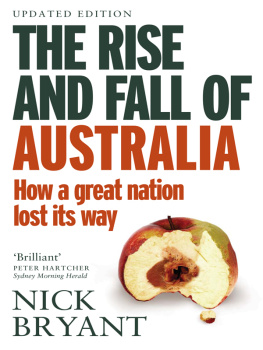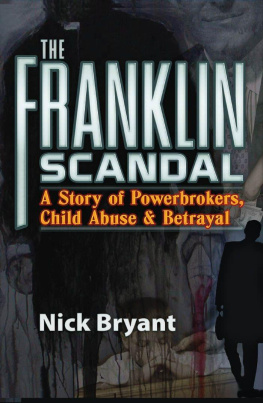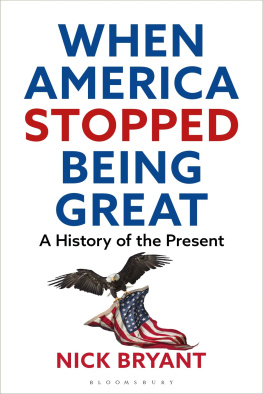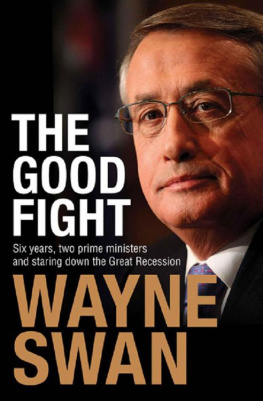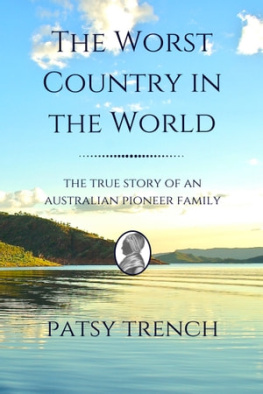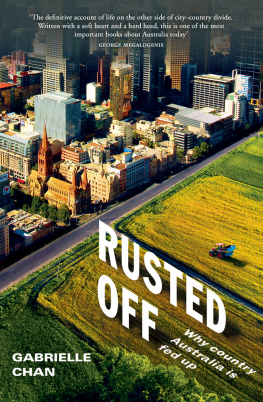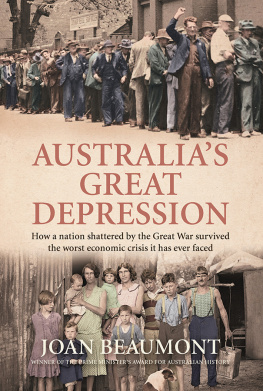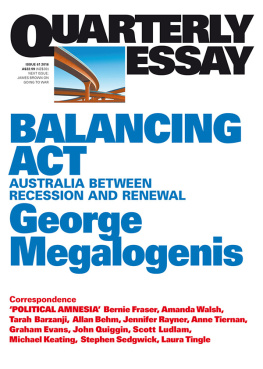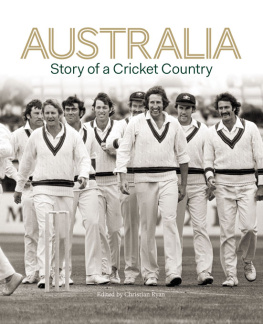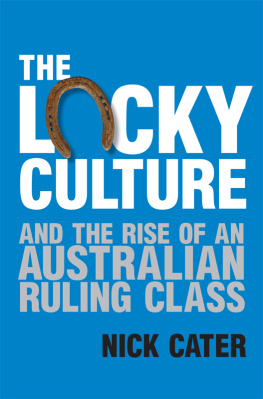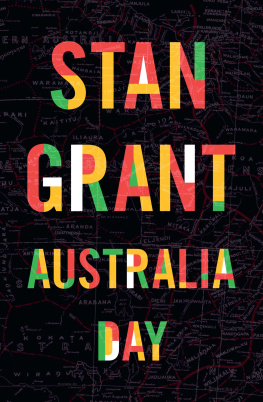
About the Book
A forensic look at the Lucky Country, from the inside and outside.
Never before has Australia enjoyed such economic, commercial, diplomatic and cultural clout. Its recession-proof economy is the envy of the world. Its the planets great lifestyle superpower. Its artistic exports win unprecedented acclaim. But never before has its politics been so brutal, narrow and facile, as well as being such a global laughing stock. A positive national story is at odds with a deeply unattractive Canberra story.
The country should be enjoying The Australian Moment, so vividly described by the best-selling author George Megalogenis. But that description may turn out to be inadvertently precise. It could end up being just that: a fleeting moment.
At present the country seems to be in speedy regression, with the nations leaders, on both sides, mired in relatively small problems, such as the arrival of boat people, rather than mapping out a larger and more inspiring national future.
In The Rise and Fall of Australia , BBC correspondent and author Nick Bryant offers an outsiders take on the great paradox of modern-day Australian life: of how the country has got richer at a time when its politics have become more impoverished.
In this thoroughly entertaining and thought-provoking book, dealing with politics, racism, sexism, the countrys place in the region and the world, culture and sport, the author argues that Australia needs to discard the out-dated language used to describe itself, to push back against Lucky Country thinking, to celebrate how the cultural creep has replaced the cultural cringe and to stop negatively typecasting itself. Rejecting most of the national stereotypes, Nick Bryant sets out to describe the new Australia rather than the mythic country so often misunderstood not just by foreigners but Australians themselves.
CONTENTS

To my favourite Australians,
Fleur, Billy and Wren
PREFACE TO THE UPDATED EDITION
OBSERVING THE CHAOTIC SCENES in Canberra since the publication of The Rise and Fall of Australia has been like watching the book get made into a movie. The rolling regicide of the Rudd-Gillard-Rudd years has continued into Tony Abbotts bungling prime ministership. Volatility has become the new normal in Australian politics. Over the past 13 years there have been 64 leadership changes at the federal and state level, a startling, Italianite figure. The countrys era of reform has given way to an era of revenge.
The excessively adversarial nature of day-to-day politics is bad enough. The excessively oppositional character of the body politic is a larger cause for concern. Political leaders with an eye on power have little incentive to come up with constructive policies or programmes, because elections are won in a blaze of negativity. Often all they have to do is to wait for their opponents to self-destruct. When new governments take charge, the cycle repeats itself because so little thought has gone into preparing for government.
The system, rather than nurturing strong prime ministers, tends only to breed effective opposition leaders. Tony Abbott is the latest to suffer from that problem. As public discourse has reached new lows, public discontent with politicians has reached new highs.
Since the publication of this book midway through 2014, the fall of Australia has been more noticeable than the rise. Its subtitle, how a great nation lost its way, also resonates more strongly. Some commentators disputed it back then. Few, surely, would do so now. Because politics has long been in a state of disrepute, much of what has unfolded was predictable enough. More unexpected has been the speed of the countrys regression. Even in the midst of so much blood-letting, it seemed unlikely, for instance, that Tony Abbott would face a spill motion less than 18 months into his first term. In titling one of the chapters The Slow Death of British Australia, I never imagined that Prince Philip, the Duke of Edinburgh, would be made an Australian knight, which suggested that true decolonisation still had some way to go. Having lamented the bellicose and inflated language of parliamentary invective, it was shocking nonetheless to hear a prime minister attack the opposition for causing a holocaust of jobs.
Inevitably, events have dated certain passages of the book, whose pages have been left largely unaltered. Richard Flanagan had not then published his haunting novel The Narrow Road to the Deep North . Rolf Harris, the Australian wash-board virtuoso as Robert Hughes once memorably called him, had not been convicted of indecent assault for molesting young girls. No children were then detained at Australias offshore detention centre in Nauru.
Overall, however, the thesis has not only withstood the passing months, but been strengthened by what has unfolded. What delighted me most about the reception to the book was that it was interpreted primarily as a love letter to Australia. This revised edition remains just that. But it comes with a new afterword that doubles as a warning: that the political recession, having already pummelled Australias reputation, runs the risk of consigning the country once more to the margins, when it should be front and centre.
Nick Bryant
New York City
July 2015
PROLOGUE
WHEN FIRST I ARRIVED in Australia it seemed strange, if not faintly ludicrous, to see maps that positioned the country in the centre of the globe, where a Briton would ordinarily expect to find the Greenwich meridian or the Cape of Good Hope. Among the places I have seen them hanging are the prime ministers suite of offices at Parliament House, the walls of the ABC headquarters and, with ever more frequency, those trendy nursery shops that you find in up-and-coming inner-city neighbourhoods, which offer a more accurate pointer of the fashions of the day. Though Australia could be forgiven these cartographic selfies, they were obviously at odds with how outsiders looked upon this distant land. More tellingly, they hardly aligned with how the country viewed itself. Australians seemed reconciled to observing the centre from the fringes, a role assigned to them by geography and history. Nor did they seem perturbed with their countrys unofficial name, the Land Down Under, even though its corollary was remoteness and unimportance. Rather, they continued to embrace it with affection.
The then Prime Minister John Howard, instead of fully embracing the Asian century, was determined to prolong the American century and also to reach back to the British century, such was his attachment to Washington and the Windsors. In the national conversation, the idea of proximity had not yet dislodged the longstanding sense of isolation.
Nowadays, those maps with Australia as the centrefold look more plausible, because the country itself feels more central. With the shift in the locus of global economic activity from the Atlantic to the Pacific has come the realisation that Australia is in the right place at the right time, a phrase with the potential to become a new national mantra. Though it still takes 23 hours to fly from Sydney to London and New York, the relatively short time it takes to sail to China has arguably become more relevant. Besides, the internet, and the absence of a geographic digital divide, has made Australia virtually close to everywhere. In an ever more interconnected world, in which foreign books, TV shows and films are almost immediately available, there is no longer the same sense of cultural lag, nor that nagging feeling that Australia is always playing catch-up with the global zeitgeist.

